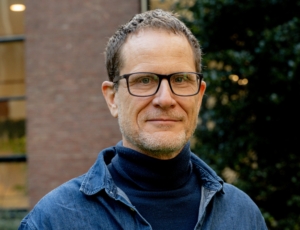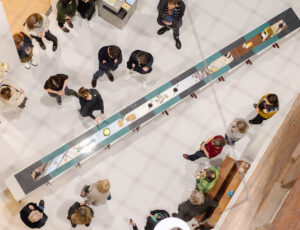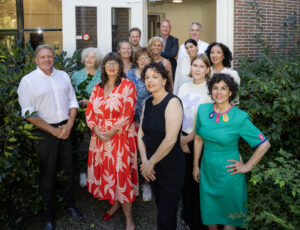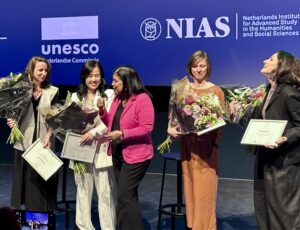The video shows a Jordanian pilot in an orange jumpsuit standing in a cage, his head bowed. A match hits unseen gasoline, and what follows is unspeakable. The pilot burns to death at the hands of the Islamic State, multiple cameras recording it in detail. The event itself was perhaps a minute, but the official edited video drags on for 22 minutes. Maximizing fear and horror on phones and computers worldwide — that’s the whole point.
Of all the geopolitical crises convulsing the Middle East today, most alarming is the rise of Islamic State (IS). Its propaganda thrives on spectacle —a self-obsessed, sensationalistic, and inciteful swarm of words, sounds and images that obliterates reality, rejects the Other, and basks in its own glory — and increasingly its opponents within the Arab world are fighting back with their own engrossing counter-spectacle.
Andrew Carnegie Fellowship
As an expert in global media studies, Marwan M. Kraidy, Professor of Media Studies at the Annenberg School for Communication, has been studying the use of communications by IS, which he approaches as a “war machine,” and his research now has a big new supporter: the Carnegie Corporation of New York.
On 19 April it was announced that Kraidy has won a 2016 Andrew Carnegie Fellowship, one of the most prestigious prizes in the social sciences and humanities, bringing with it a grant of up to $200,000.
Kraidy, the Anthony Shadid Chair in Global Media, Politics and Culture and Founding Director of the Project for Advanced Research in Global Communication (PARGC) at the Annenberg School for Communication, is one of 33 new Andrew Carnegie Fellows who are given funding to pursue one to two years of scholarly research and writing aimed at addressing some of the world’s most urgent challenges to U.S. democracy and international order.
Kraidy argues that the Islamic State’s threat to global security is intimately connected to its uses of media and technology, which allow it to physically occupy relatively little territory, but still maintain a global presence through speed and spectacle. It is a war machine of the digital age.
On April 7, Kraidy spoke on this very topic at the Second Biennial PARGC Symposium, “Convergence and Disjuncture in Global Digital Culture,” and shortly thereafter, got an alert that the Islamic State had released a book through its own publication house praising media workers as jihadis and giving instructions on how to use the media to further jihad.
Kraidy may translate the volume into English — he is fluent in Arabic, French, English, and nearly-so in Spanish, with some knowledge of German and Italian — but certainly the volume is evidence of how current and evolving the topic is.
“ISIS puts out a spectacle, and it needs to be understood in a new way,” he says. “It’s not a message/message rebuttal two-way communication. Spectacle has its own rules, and IS’s a unique spectacle that is networked globally. A rigorous grasp of that spectacle is necessary in order to understand and counter IS.”
At the same time, Arab feminist bloggers and artists have begun to mount a counter-spectacle.
The Naked Blogger of Cairo
Kraidy’s forthcoming tenth book, The Naked Blogger of Cairo (Harvard University Press), will be available on May 9. Focusing on the body as a physical and symbolic locus of power and dissent, the book explores the “creative insurgency” that arose in response to 2010’s Arab Spring — self-immolation, graffiti, puppet shows, cartoons, photographs, political satire all as an expression of resistance to dictatorship and repression.
Marwan M. Kraidy talks about his new book
Some of the activists depicted in that book have continued on to be just as forcefully anti-ISIS and Kraidy plans to explore how they may be contributing to the counter-spectacle.
For example, the title character of the book, an Egyptian woman named Aliaa al-Mahdy, created a sensation in 2011 by posing naked on her blog in protest, her direct gaze and full frontal nudity a direct challenge to the Egyptian patriarchy and regime. In 2014, she and a fellow activist photographed themselves menstruating and defecating on the Islamic State’s flag, wearing only shoes.
“It was incendiary, and in this, we see IS’s spectacle turned against itself,” Kraidy says. “The seeds for my project on the IS spectacle were planted in the Naked Blogger of Cairo’s conclusion.”
One of 33 scholars
In this, the Andrew Carnegie Fellowship’s second year, the Carnegie Corporation will award a total of $6.6 million to the 33 scholars. More than 600 leaders representing a range of universities, think tanks, publishers, and nonprofit organizations nationwide nominated 200 candidates, whose proposals were evaluated by an anonymous team of prominent scholars, educators, and intellectuals. The final selections were made by a distinguished panel of 16 jurors.



